A Study on the Impact of Reward Programs on Building Brand Loyalty for Buffet Restaurants and Perception of Environmental Value
คำสำคัญ:
Intrinsic and extrinsic motivations, rewards, loyalty programs, brand loyalty, engagement, perceived environmental value, buffet restaurantsบทคัดย่อ
This study explores the impact of reward programs on building brand loyalty and enhancing the perception of environmental value among consumers of buffet restaurants in Bangkok and its vicinity. With intense competition and rising raw material costs in Thailand’s restaurant industry, reducing food waste while fostering customer loyalty is vital. The research employs a quantitative approach, utilizing survey data from 428 consumers, categorized by reward type and frequency of visits. Structural Equation Modeling (SEM) reveals that rewards and brand engagement significantly influence both intrinsic and extrinsic motivations, leading to higher participation in loyalty programs. Findings indicate that different reward types (restaurant vs. shopping mall coupons) and visit frequencies affect the perceived effectiveness of loyalty programs. Consumers receiving restaurant coupons emphasize environmental value and brand engagement as key to loyalty, whereas those with shopping mall coupons focus more on the loyalty program itself. The study concludes that integrating rewards, motivations, and sustainability into loyalty programs not only boosts customer engagement but also supports environmental sustainability. These insights suggest that effective loyalty programs in buffet restaurants should balance rewarding consumer participation and promoting sustainable practices, contributing to both brand loyalty and environmental awareness.
This research provides a framework for businesses to develop strategic loyalty programs that align with consumer behavior and environmental goals, offering a pathway to long-term sustainability and profitability in the restaurant sector.
เอกสารอ้างอิง
Baldwin, C. J., & Shakman, A. (2012). Food waste management. Greening Food and Beverage Services: A Green Seal Guide to Transforming the Industry. Washington, DC: Green Seal.
Bijmolt, T. H., Leeflang, P. S., Block, F., Eisenbeiss, M., Hardie, B. G., Lemmens, A., & Saffert, P. (2010). Analytics for customer engagement. Journal of service research, 13(3), 341-356.
Brodie, R. J., Ilic, A., Juric, B., & Hollebeek, L. (2013). Consumer engagement in a virtual brand community: An exploratory analysis. Journal of business research, 66(1), 105-114.
Chen, Y. M., Su, Y. P., & Lin, F. J. (2022). Exploring the effects of environmental rewards and environmental brand benefits on consumer's product evaluation. Journal of Retailing and Consumer Services, 64, 102807.
Chen, Y. S., & Chang, C. H. (2013). Towards green trust: The influences of green perceived quality, green perceived risk, and green satisfaction. Management decision, 51(1), 63-82.
Daryanto, A., de Ruyter, K., Wetzels, M., & Patterson, P. G. (2010). Service firms and customer loyalty programs: a regulatory fit perspective of reward preferences in a health club setting. Journal of the Academy of Marketing Science, 38, 604-616.
Delmas, M. A., & Lessem, N. (2017). Eco-premium or eco-penalty? Eco-labels and quality in the organic wine market. Business & Society, 56(2), 318-356.
Dorotic, M., Verhoef, P. C., Fok, D., & Bijmolt, T. H. (2014). Reward redemption effects in a loyalty program when customers choose how much and when to redeem. International Journal of Research in Marketing, 31(4), 339-355.
Hapsari, R., Clemes, M. D., & Dean, D. (2017). The impact of service quality, customer engagement and selected marketing constructs on airline passenger loyalty. International Journal of Quality and Service Sciences, 9(1), 21-40.
Kim, J. (2018). Philosophy of mind. New York: Routledge.
Oliver, R. L. (1999). Whence consumer loyalty?. Journal of marketing, 63(Special Issue 1999), 33-44.
Rehnen, L. M., Bartsch, S., Kull, M., & Meyer, A. (2017). Exploring the impact of rewarded social media engagement in loyalty programs. Journal of Service Management, 28(2), 305-328.
Ryan, R. M., & Deci, E. L. (2000). Intrinsic and extrinsic motivations: Classic definitions and new directions. Contemporary educational psychology, 25(1), 54-67.
Smith, N. (2014). How to get fans to cheer your brand on. Retrieved from: https://www.marketingweek.com/how-to-get-fans-to-cheer-your-brand-on/.
Van Doorn, J., Lemon, K. N., Mittal, V., Nass, S., Pick, D., Pirner, P., & Verhoef, P. C. (2010). Customer engagement behavior: Theoretical foundations and research directions. Journal of service research, 13(3), 253-266.



